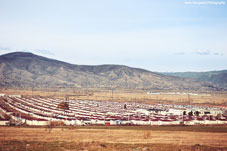
UN Special Reporter was denied entry into Georgia’s de-facto areas
By Messenger Staff
Wednesday, September 28
The United Nations (UN) Special Rapporteur on Human Rights of Internally Displaced Persons (IDPs), Chaloka Beyani, says he asked permission to enter Georgia’s occupied regions of Abkhazia and Tskhinvali (South Ossetia) before coming to Georgia, but his request was dismissed.
Beyani told this to Georgia’s Foreign Affairs Mikheil Janelidze on September 26 at the Ministry headquarters in central Tbilisi, where the two discussed human rights and the IDP issue.
Georgia has about 260,000 IDPs who were forced from their homes during internal conflicts in the country’s Abkhazia and Tskhinvali regions.
Janelidze stated that Georgia faced a hard situation in terms of human rights in the de-facto regions and at the Administrative Boundary Lines (ABL) separating the areas from the rest of Georgia.
Janelidze also stressed the importance of the presence of international observing missions in the de-facto regions occupied by Russia, as now only the European Union Monitoring Mission (EUMM) operated in Georgia, but they had no access to the occupied territories.
“I see the progress that Georgia has recently achieved in terms of improving living conditions of IDPs, refining legislation in relation of the category of people, and also the country managed to provide long-lasting settlement of some important issues,” Beyani said.
Currently, four countries recognise Abkhazia and Tskhinvali (South Ossetia) as independent republics.
Russia and Nicaragua recognised Abkhazia’s and Tskhinvali’s independence in 2008 in the wake of the Russia-Georgia war. In 2009 Venezuela, Nauru and Tuvalu took the same step but after several years Vanuatu reversed its position and recognised the regions as part of Georgia.
The rest of the international community says the regions are integral parts of Georgia.


